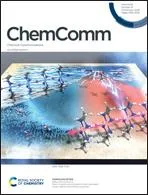Non-aqueous neptunium and plutonium redox behaviour in THF – access to a rare Np(iii) synthetic precursor
文献情報
Nickolas H. Anderson, Suzanne C. Bart, Andrew J. Gaunt, Brian L. Scott
Solvent exchange of NpCl4(DME)2 with THF proceeds simply to yield NpCl4(THF)3, whereas PuCl4(DME)2 is unstable in THF, partially decomposing to the mixed valent [PuIIICl2(THF)5][PuIVCl5(THF)] salt. Reduction of NpCl4(THF)3 with CsC8 ultimately afforded NpCl3(py)4, the only example of a structurally characterized solvated Np(III) halide. The method demonstrates a route to a well-defined Np(III) starting material without the need to employ scarcely available Np metal.
関連文献
IF 6.222
Engineering of electrodeposited binder-free organic-nickel hydroxide based nanohybrids for energy storage and electrocatalytic alkaline water splittingIF 6.367
Carbon-based photocatalysts for enhanced photocatalytic reduction of CO2 to solar fuelsIF 6.367
Synthesis and hydrogen evolving catalysis of a panchromatic photochemical molecular deviceIF 6.367
From Douglas fir to renewable H2-enriched syngas via ex situ catalytic pyrolysis over metal nanoparticles–nanocellulose derived carbon catalystsIF 6.367
The limits to biocatalysis: pushing the envelopeIF 6.222
Nickel-containing N-doped carbon as effective electrocatalysts for the reduction of CO2 to CO in a continuous-flow electrolyzerIF 6.367
Efficient one-pot synthesis of alkyl levulinate from xylose with an integrated dehydration/transfer-hydrogenation/alcoholysis processIF 6.367
Effective utilisation of waste cooking oil in a single-cylinder diesel engine using alumina nanoparticlesIF 6.367
Mechanism of lignocellulose modification and enzyme disadsorption for complete biomass saccharification to maximize bioethanol yield in rapeseed stalksIF 6.367
掲載誌
Chemical Communications

ChemComm publishes urgent research which is of outstanding significance and interest to experts in the field, while also appealing to the journal’s broad chemistry readership. Our communication format is ideally suited to short, urgent studies that are of such importance that they require accelerated publication. Our scope covers all topics in chemistry, and research at the interface of chemistry and other disciplines (such as materials science, nanoscience, physics, engineering and biology) where there is a significant novelty in the chemistry aspects. Major topic areas covered include: Analytical Chemistry Catalysis Chemical Biology and medicinal chemistry Computational Chemistry and Machine Learning Energy and sustainable chemistry Environmental Chemistry Green Chemistry Inorganic Chemistry Materials Chemistry Nanoscience Organic Chemistry Physical Chemistry Polymer Chemistry Supramolecular Chemistry
おすすめサプライヤー
 DECKMA HAMBURG GmbH
DECKMA HAMBURG GmbH 株式会社AAT Bioquest
株式会社AAT Bioquest レイ相关新闻(常州)国際貿易有限公司
レイ相关新闻(常州)国際貿易有限公司 Sohena GmbH
Sohena GmbH 三原金瑞生物工程有限公司
三原金瑞生物工程有限公司 HSTマシンバウ GmbH
HSTマシンバウ GmbH 常州コウワイグisible化工有限公司
常州コウワイグisible化工有限公司 戴科化学贸易化学(上海)有限公司
戴科化学贸易化学(上海)有限公司 遼陽石化億方工業会社商品営業部
遼陽石化億方工業会社商品営業部 ミシェル・バウレ SA
ミシェル・バウレ SA














